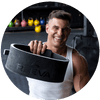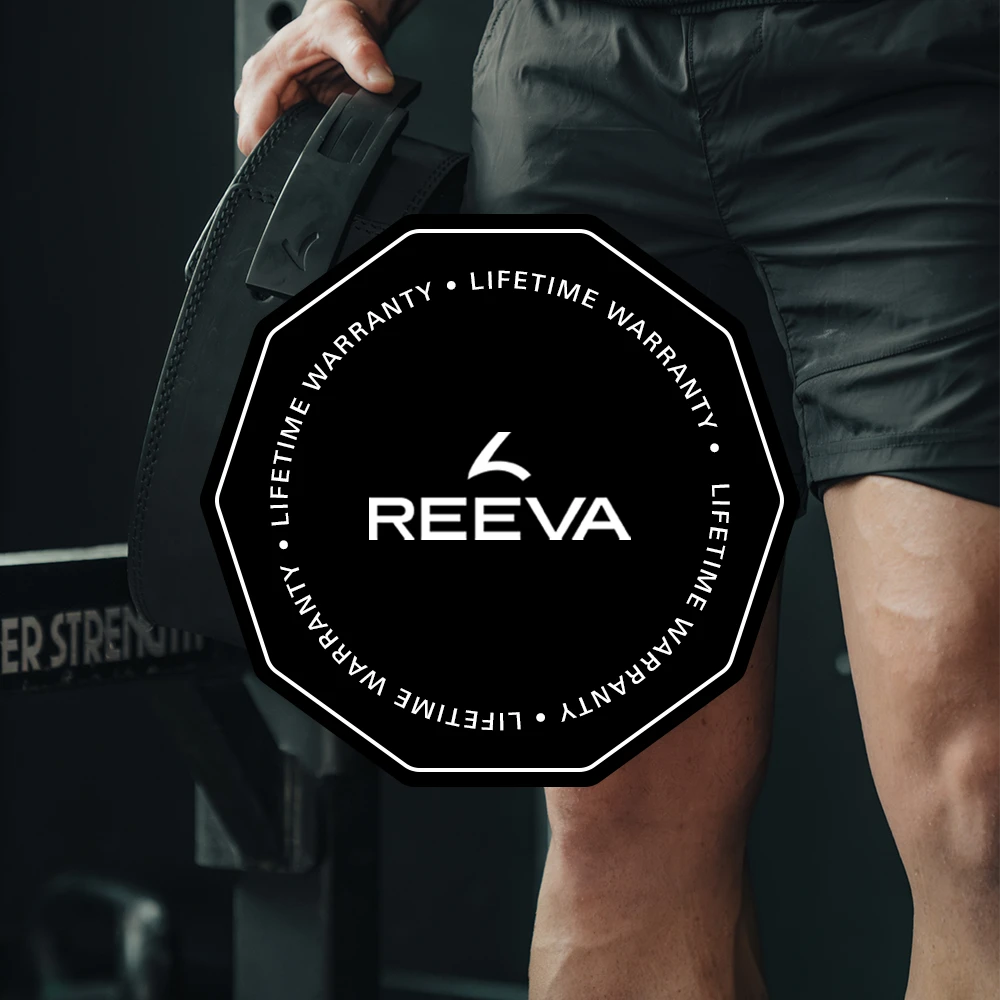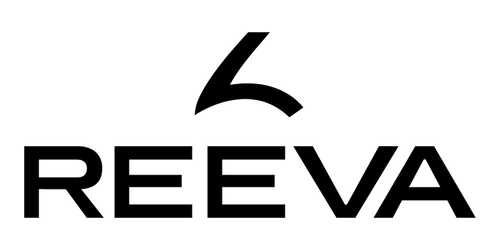What customers say about this product
Eva-Foam Gewichthebergürtel
✓ Hergestellt aus 100% echte Materialien
✓ Sehr dauerhaft und kurze Einlaufzeit
✓ Lebensdauer Garantie auf diesem Hebeband
Vorgestellt auf ↓

Check out our latest innovation: the new Eva Foam Lifting Belt with quick release system. The belt is specifically designed for weightlifting and functional training and offers balanced support throughout the back without restricting movement.
Minimize risk, maximize your performance.

"My secret weapon for unlocking new levels of strength"
~ Rob Lipsett, Athlete & Entrepeneur
-
Einfach ausgedrückt: Die billigeren Gürtel, die den Markt überschwemmen, werden in China mit billigen Materialien in Massenproduktion hergestellt. Sie sind aus PU-Leder gefertigt und mit Pappfüllung gefüllt.
Mit der Zeit kriecht Feuchtigkeit ein und zersetzt den Karton. Das Ergebnis ist ein Hebegurt, der nicht die richtige Unterstützung bietet und daher seinen Zweck verliert. Es mag aussehen wie ein echtes Hebeband, aber glauben Sie uns, sie werden nicht lange halten.
Reeva Hebegurte werden von erfahrenen Handwerkern mit Präzision gefertigt. Wir verwenden die feinsten Büffelhäute aus exklusiven Gerbereien, die eine unübertroffene Qualität und Langlebigkeit gewährleisten.
Darüber hinaus werden unsere speziell verstärkten Edelstahlschnallen von lokalen Schmieden geschmiedet. Das bedeutet, dass unsere Schnallen unglaublich robust und praktisch unzerstörbar sind.
Wir sprechen hier von erstklassiger Qualität, die eine lebenslange Nutzung garantiert. Sind Sie bereit, etwas mehr für ein Produkt zu investieren, das die Konkurrenz nicht nur in den Schatten stellt, sondern sie auch meilenweit überdauert?
-
Wir glauben wirklich an die Qualität unserer Produkte. Deshalb bieten wir eine lebenslange Herstellergarantie auf dieses Gürtel. Wenn Ihr Artikel aufgrund fehlerhafter Verarbeitung bricht, bieten wir einen kostenlosen Ersatz an.
-
• 100% handgefertigt in unserer eigenen Fabrik
• Hergestellt mit dem stärksten synthetischen Faden im heutigen Einsatz
• Korrosions- und spannungsbeständig bis 9,344 ps
• Präzise abgesetzte Löcher für optimalen Komfort und Halt
• Hydraulischer Strahl gepresstes reflektierendes Logo
-
Wie hoch sind die Versandkosten nach Deutschland?
Ab einem Bestellwert von 100 € bieten wir kostenlosen Versand an. Der normale Versand (Bestellungen unter 100 €) nach Deutschland kostet 9,95 €.Wie wird meine Bestellung versendet?
Ihre Bestellung in Frankreich wird mit DHL oder DPD geliefert. Sobald die Bestellung unser Lager verlässt, erhalten Sie einen Track-and-Trace-Link.Wie lange dauert es, bis ich meine Bestellung erhalte?
Ihre Bestellung in Deutschland wird innerhalb von 3-5 Werktagen geliefert. -
Kann ich meine Bestellung zurückgeben, wenn sie mir nicht gefällt?
Ja, wir akzeptieren gerne Rücksendungen und bieten eine volle Rückerstattung.Was soll ich tun, wenn mein Produkt beschädigt ist?
Bitte wenden Sie sich an unseren Support! Wenn Sie in Ihrem Konto angemeldet sind, wird das Support-Ticket-System im unteren Teil Ihres Bildschirms angezeigt.Derzeit können nur angemeldete Benutzer dieses System nutzen.
Die Vorteile eines Gewichthebegürtel für Ihr Training 👇

Lebenslange Garantie
Wenn Sie in hochwertige Fitnessgeräte investieren, ist es wichtig, auf die Langlebigkeit und Langlebigkeit des Produkts zu vertrauen. Unsere Produkte sind speziell dafür entwickelt, Ihre härtesten Trainingseinheiten zu absolvieren und zu überdauern. Wenn Sie bei uns Ausrüstung kaufen, wird diese durch das Reeva-Versprechen untermauert. Wir stehen hinter unseren Gewichthebergeräten und -zubehör und sind zuversichtlich, dass Sie unsere erstklassigen Produkte lieben werden.
Bei einem Herstellungsfehler (wie z. B. gebrochene Nähte oder andere Schäden bei der Ankunft) können Sie es für die Lebensdauer des Gürtels zurückgeben.
Frequently Asked Questions about Lifting Belts
-
A lifting belt provides support to your lower back and core muscles during heavy lifting exercises. It helps to stabilize your spine and reduce the risk of injury by increasing intra-abdominal pressure. This can improve your overall lifting performance by allowing you to lift heavier weights with better form.
Remember, a lifting belt isn't a magic item. It's important to use it with proper technique and training for best results. Using a lifting belt in your workouts can make you stronger and help prevent injuries. It's a good addition to your routine.
-
A lifting belt can help with strength training, but it's not essential for everyone. If you are a beginner or are not lifting extremely heavy weights, you may not need to use a lifting belt.
Before using a belt for support, it is important to build core strength and learn proper lifting technique. This will help create a strong foundation. Using a lifting belt too often can make your core muscles weaker. This is because they might rely too much on the support the belt provides instead of getting stronger by themselves.
Ultimately, you should base the decision to use a lifting belt on your individual needs and goals. If you're not sure if you need a lifting belt, ask a fitness professional for advice.
-
It is best to wear a lifting belt for heavy lifting exercises like squats, deadlifts, and overhead presses for safety. The lifting belt gives extra support and stability to your core, which is helpful when lifting heavy weights. However, it is important to remember that a lifting belt is not a substitute for proper form and technique. You should use it in conjunction with a solid foundation of core strength and good lifting mechanics.
Some lifters also choose to wear a belt during max effort lifts or when they are attempting new personal records. This extra support can help reduce the risk of injury and provide added confidence during challenging lifts.
Ultimately, you should base the decision to wear a lifting belt on your individual goals and comfort level. If you are unsure, start by using the belt into your training gradually and see how it feels. Remember, listening to your body and prioritizing safety should always come first in your fitness journey.
-
When picking a lever lifting belt, it's crucial to know the distinctions between a lever belt and a standard prong belt. A lever belt has a lever mechanism for adjusting tightness, while a regular prong belt uses a buckle. Knowing these distinctions can help you make the right choice for your lifting needs. Considering your preferences and lifting style is essential when deciding between the two types of belts.
A lever belt is easier to adjust and secure in place with a lever mechanism for precise adjustments. This can be beneficial for lifters who prefer a quick and secure fit without the hassle of adjusting prongs.
Some weightlifters may find it harder to put on and take off a lever belt compared to a regular prong belt. Additionally, lever belts tend to be more expensive than prong belts, so cost may be a factor to consider.
-
Use this text block to discuss some commonly asked questions like shipping and returns, sizing, warranties, or product and company details.
-
Belts can help increase squat weight, but the amount added depends on the person's strength and lifting skills. Wearing a belt can help people lift heavier weights more comfortably, possibly increasing their squat by 10-20%. In the end, Lifting Belts do not help you lift more weight, but they support your core during heavy lifts.
It's always best to focus on building strength and proper technique first, rather than relying solely on a belt to boost your squat numbers. Remember, consistency and dedication to your training will ultimately lead to progress and improvement in your squat performance.
-
Using a belt while lifting heavy weights can help stabilize the spine, reduce injury risk, and increase pressure in the abdomen. Belts can also provide a tactile cue for bracing your core, helping you maintain proper form throughout the lift. Some weightlifters feel more confident and mentally strong when wearing a belt, which can help them lift heavier weights.
However, there are also some cons to consider when lifting with a belt. Using a belt too frequently can weaken your core muscles over time.
They become dependent on the belt for support instead of developing their strength independently. This can ultimately hinder your overall strength and stability in the long run. Using a belt in training should be an addition, not a replacement for good technique and strong core muscles.
Decide whether to use a belt based on your goals, experience, and comfort level when lifting weights. Talk to a coach or trainer to see if you should use a belt when lifting weights. Remember, proper technique, consistency, and progressive overload are key factors in improving your strength and performance in the gym.
-
Choosing between a 10mm or 13mm belt depends on what feels best for you. It's all about personal preference.
The 13mm belt is typically thicker and may provide more support, while the 10mm belt is slightly lighter and more flexible. Some weightlifters like the 13mm belt for heavy lifts because it provides more stability. Others prefer the 10mm belt for deadlifts and squats because it is less restrictive.
Try both belt sizes to see which one helps you keep good form and feel secure during lifts. Remember, the belt should enhance your performance, not hinder it. Choose the belt that best aligns with your lifting goals and technique, and always prioritize safety and proper form above all else. With the right belt and proper technique, you can take your lifting to the next level and reach your strength goals effectively.
















